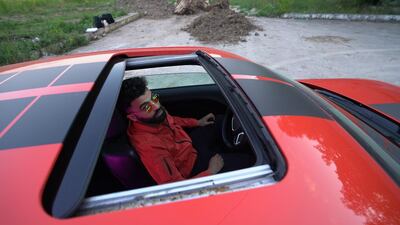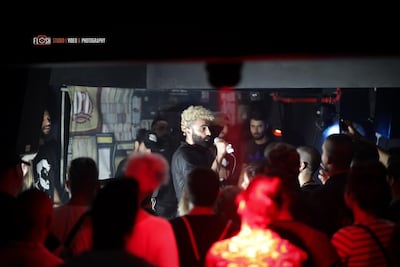After seeing his career go through seismic shifts that would knock most artists for six, Emsallam Hdaib, 28, has released a new album that is as candidly vulnerable as it is defiant.
Named after the learning disorder the Jordanian-Palestinian artist is diagnosed with, Dyslexia seems less concerned with making searing political examinations than it is with forging a path towards his mental well-being. For the rapper, known mononymously as Emsallam, that path has been thorny and meandering.
"I didn't want to talk about a lot of politics in this one," Emsallam says. "I wanted the album to be a spiritual journey. It's more personal."
The Khawa rapper has been labelled everything from revolutionary, trailblazing lyricist to someone hindering the Palestinian cause, after being shunned by the Boycott, Divestment and Sanctions (BDS) movement in 2018. It was an episode in Emsallam's life that led to him being attacked online and on the streets of Haifa.
"My brain stopped functioning," Emsallam says, recalling his state in the months after the attacks. "I was extremely paranoid and afraid. I had to seek therapy." Dyslexia, the artist says, was a way of "reclaiming my sanity".
At first listen, Emsallam's third album seems like a logical progression from his past releases as the rapper reprises his signature barbed flow, taking on sexism and chauvinism in the region with an unflinching, at times satirical, approach. The album – produced by Emsallam's long-time collaborator Ayman Al Salhi, better known as The Archiducer – has many of the same sonic elements that popularised Emsallam's previous works – the its detuned bass drums, glassy synth lines and drilling hi-hats the trap genre is renowned for. It also features samples of classic regional songs, including Abdel Halim Hafez's Na'am Ya Habibi.
The album opens with Ferdy, in which Emsallam takes on the persona of the popular cartoon anthropomorphic ant, declaring "I am an ant, no one has my patience" before leading to the delightfully bawdy PMWL, for which the rapper puts the notion of nationalism in his cross hairs. With the groovy, tambourine-infused Aref Innak, featuring Palestinian singer Adan Wakeem, Emsallam begins drawing back the curtain on a wafting sense of self.
It doesn’t take long after that for the confessional nature of the album to become clear.
In Dasher Hosromna, the rapper alludes to the enthusiasm he felt when marrying his wife, Anna, in 2020. In Ya Alem AlHal, in which Emsallam, in the cadence of a prayer, asks God for guidance and strength.
The rapper calls Dyslexia the final instalment of a trilogy he began with The Last Step. Released in 2016, the artist's first full-length album was replete with existential themes that also factored in the complexities of Arab identity with songs such as Edward Said and Khawa. It was an explosive entry for the rapper into the scene, amassing millions of views across his online platforms and marking a fiery new chapter in the Arabic rap genre.
Emsallam's follow-up album, Postcolonialism, released in 2018, picks up on many of the same themes as its predecessor. In it, he takes on patriarchy and tribalism in the Middle East, and scathingly criticises the Israeli government's treatment of Palestinians. The album was praised for holding up a great, blemished humanist mirror for Arab society to examine itself under an uncomfortable light.
The success of Postcolonialism inspired Emsallam to visit Palestine for the first time. Hoping to perform in his ancestral land, he embarked on a journey that would end up having an adverse effect on his mental health and career.
"I was shaking," says Emsallam, who was born in Amman. He recounts how he was out walking in Haifa, holding the hand of his then-girlfriend Anna, a Russian-Israeli, when he found out that BDS had issued a statement condemning him for obtaining an Israeli entry permit. A move the group criticised as a step towards normalising ties with Israel.
"I couldn't believe it. I was shocked. I was going to Haifa to play for a Palestinian audience in a venue owned by a Palestinian. Why were they condemning me?" Emsallam says.
For the young rapper, the trip was about more than simply performing, it was about fulfilling a dream to visit his ancestral home. "My father is from Hebron. My mother was born in Ain Sultan, a refugee camp in Arihah."
However, the statement issued by BDS against Emsallam had consequences that spread like wildfire. While the rapper performed at a sold-out venue in Haifa in September 2018, a string of three other concerts he had scheduled in Ramallah and Jenin were cancelled.
Heartbroken and dazed, Emsallam returned with Anna to Moscow, where he had been living since 2017 to pursue a master's degree in ceramics. The rapper suddenly found himself outcast by the community he thought would have been his first supporters.
“I felt alone. I began releasing a series of angry, very angry songs,” Emsallam says. “I didn’t care about the quality of what I was releasing. Whether they were mixed or mastered.”
In the summer of 2019, Emsallam made plans to travel to Jordan, and then Palestine once again, but this time with the intention of "reviving his career" as well as introducing Anna to his family.
"I had a tour planned and also wanted my family to give their blessing so I can pursue the marriage," Emsallam says. Considering Anna's Jewish heritage, it was especially important for him that his family bless their marriage, which they did.
However, as smoothly as things were going in his private life, the same couldn't be said for his music career.
Levantine rappers who had previously collaborated withEmsallam suddenly wanted nothing to do with him. "Jordanians with Jordanian backgrounds were patronisingly saying I wasn't Jordanian but Palestinian," he says. "Palestinians were cursing me, too. Seeing these comments, it was just hard to believe what was happening. I was being attacked from all sides."
Things only got harder for the rapper when on the night before a show in Haifa, he was attacked on the street and ended up in hospital, having to get stitches to his cut ear.
"I didn't recognise him at first," Emsallam says of his assailant. "He was a rapper who had come up on stage during the Haifa show in 2018 and wanted to do a rap battle with me. It was during the middle of the show. I mocked him and the security there kicked him off the stage."
Emsallam says the period that followed was one of the darkest of his life. Growing increasingly paranoid, he blocked the windows of his Moscow home with his paintings to avoid feeling like he was being watched.
While Emsallam says he's not completely OK today and still has a long way to go to reclaim his mental well-being, he has begun taking care of himself and and seeking therapy.
"I was questioning identity in The Last Step," Emsallam says, linking the trajectory of his three albums with his sense of self. "I kind of knew who I was by Postcolonialism but still questioned it. In the Dyslexia album, I totally lost my identity but realised I needed sanity more than I needed identity," he says. "I mean every word I've ever rapped about. There's no buffer between who I am in real life and in my music. In fact, my music is my manifesto."





